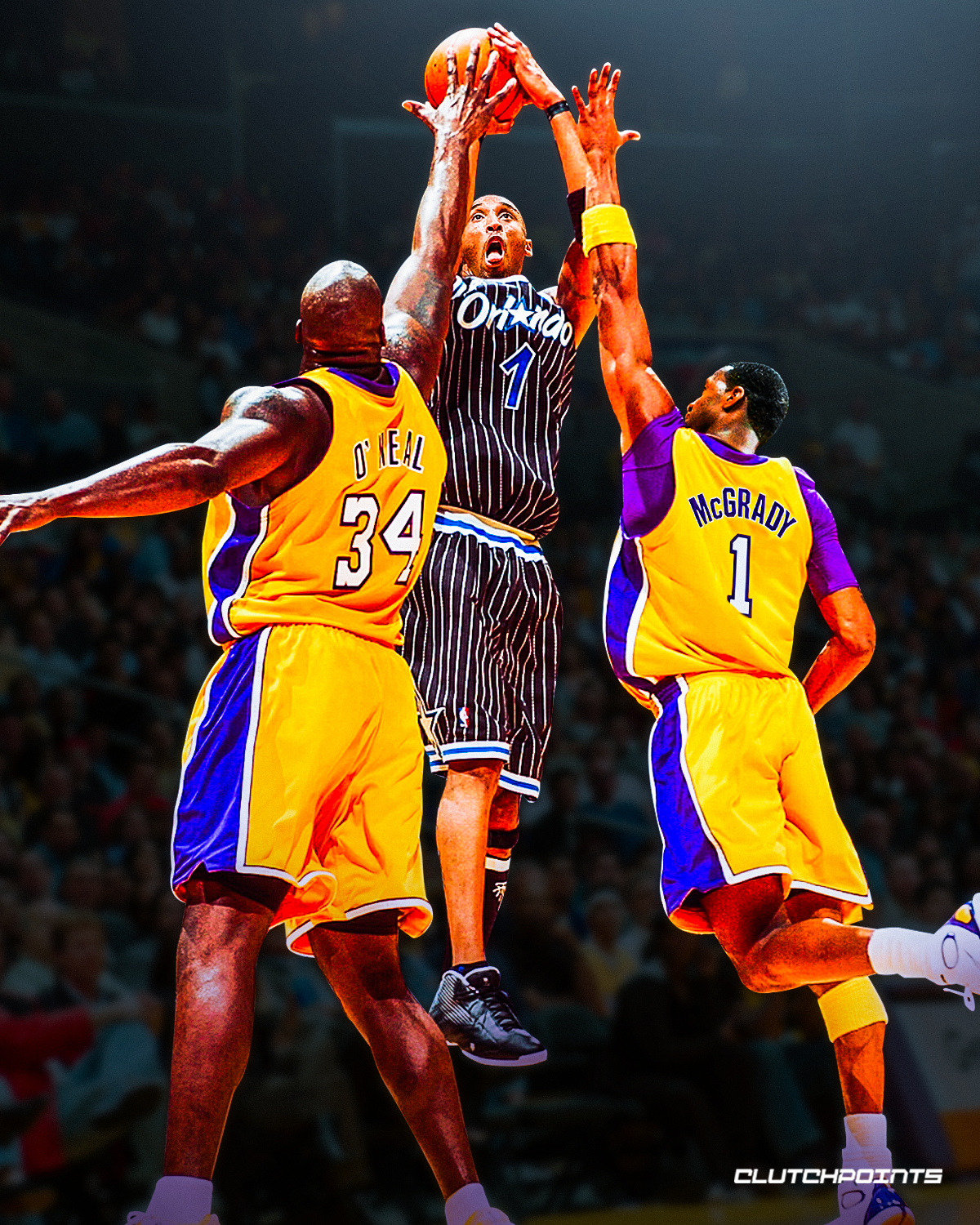TRACY McGRADY UNLEASHES SHOCKING TRUTH ON FIRST TAKE: “If I Had Shaq in My Prime Like Kobe Did, I’d Without Question Have Carried the Lakers to an NBA Championship
Tracy McGrady has never been one to shy away from bold statements, and recently, during a fiery segment on ESPN’s First Take, the Hall of Famer laid down a challenge that reverberated through the basketball community. Speaking candidly about his career and the difference teammates can make, McGrady made a powerful declaration: if he had the dominant Shaquille O’Neal in his prime, like Kobe Bryant did during his time with the Los Angeles Lakers, there’s no doubt he would have led that team to an NBA Championship.
This statement has sent waves across the basketball world, sparking debate about McGrady’s place among the all-time greats and the importance of superstar partnerships in achieving ultimate success.
To fully understand the weight of McGrady’s claim, it’s essential to revisit his career trajectory and the context behind his assertion. Tracy McGrady, or “T-Mac” as he’s fondly known, was widely regarded as one of the most electrifying scorers of his generation. Blessed with exceptional size, skill, and agility, McGrady dazzled fans with his scoring prowess, highlighted by multiple scoring titles and All-Star appearances. However, despite his individual brilliance, an NBA Championship eluded him throughout his career.
Meanwhile, Kobe Bryant, one of the most iconic figures in NBA history, shared the court with Shaquille O’Neal in the early 2000s, forming one of the most dominant duos ever assembled. Together, they led the Lakers to a three-peat championship run from 2000 to 2002, a feat that solidified their legacy as one of the most formidable tandems in basketball lore.
McGrady’s remarks on First Take directly addressed this dynamic. “Replace Kobe with me with Shaq. I don’t win a championship? You don’t think I could carry the Lakers to a Championship?” he boldly challenged. This statement is not just a reflection of confidence but a commentary on how the right partnership and team structure can elevate a player’s chances at winning it all.
One can’t dismiss the significance of having a dominant big man like Shaq as a teammate. Shaq’s presence in the paint demanded constant defensive attention, often collapsing opposing defenses and creating open opportunities for perimeter players. Kobe, an elite scorer and relentless competitor, capitalized on Shaq’s dominance to carve out space for himself and ultimately claim multiple championships. The synergy between the two was undeniable, though their relationship was famously tumultuous.
McGrady’s point underscores a broader discussion about the role of team composition and star partnerships in the NBA. Basketball, while showcasing individual talent, is ultimately a team sport where chemistry, fit, and support cast a long shadow on championship aspirations. Many great players have had outstanding careers but fell short of a title due to lack of complementary talent or unfortunate circumstances.
Looking back, McGrady’s own career was marked by flashes of brilliance but also by injuries and lack of consistent superstar support. His stints with the Toronto Raptors, Orlando Magic, and Houston Rockets saw him shine, but the Lakers’ brand of success — pairing a transcendent big man with a scoring guard — was never a part of his journey.
Some critics might argue that McGrady’s statement is audacious or speculative. After all, no one can rewind the clock and truly know how he’d perform alongside Shaq. However, there’s merit to McGrady’s assertion. His scoring ability, versatility, and clutch performances demonstrate he had the skill set to thrive with a dominant inside presence. The combination of McGrady’s mid-range and perimeter scoring with Shaq’s inside force could have created a nightmare for opponents, reminiscent of the Kobe-Shaq tandem but with a different flavor.
Moreover, McGrady’s quote also touches on the frustration that many great players feel when their career achievements are measured solely by championships. While titles are a key marker of success, they are influenced by numerous factors beyond individual talent, including team composition, coaching, injuries, and even luck. McGrady’s statement is a reminder that greatness is more nuanced than rings alone.
This moment on First Take also invites reflection on the Lakers’ franchise history. The Lakers have long been a destination for elite talent, with numerous dynasties built around star pairings. From Magic Johnson and Kareem Abdul-Jabbar to Kobe Bryant and Shaquille O’Neal, the Lakers have showcased how pairing two transcendent players can lead to championship glory. McGrady’s boldness in suggesting he could have thrived in such a setting speaks to his belief that he belongs in that elite echelon of NBA legends.
Fans and analysts alike have reacted with mixed emotions. Some praise McGrady’s confidence and envision the hypothetical matchup with enthusiasm, imagining how his unique scoring abilities could have complemented Shaq’s dominant presence. Others are skeptical, noting that basketball success is not just about talent but also about intangible qualities like leadership, chemistry, and timing.
Regardless of where one stands, McGrady’s candidness shines a light on the complexities of NBA greatness. His words spark valuable conversations about how much influence teammates and context have on individual legacies. It also highlights the what-ifs that haunt many careers — the alternate realities where different circumstances might have led to different outcomes.
In conclusion, Tracy McGrady’s bold declaration on First Take resonates far beyond just a provocative soundbite. It challenges fans, players, and historians to reconsider the narratives around championships and individual greatness. If McGrady had Shaquille O’Neal by his side during his prime, there’s a compelling argument that the basketball world would be talking about T-Mac not just as a scoring legend but as an NBA Champion who carried a storied franchise like the Lakers to the promised land. Whether or not history could have unfolded that way, McGrady’s confidence and candid reflection add another fascinating chapter to the ongoing debate about what it takes to become a true NBA legend.



